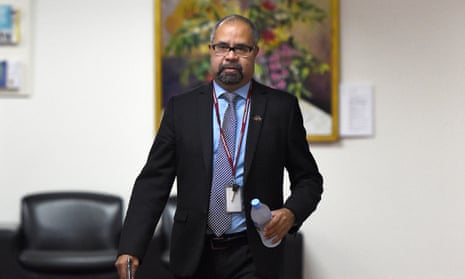Indigenous MP Billy Gordon has rebuked a property developer for what he said was its “ignorant and appalling” portrayal of history on a Brisbane site where generations of Aboriginal children endured forced removal from their families.
The state MP for Cook has asked developer Cedar Woods to withdraw a submission to Brisbane city council that showcases the heritage site redevelopment without any reference to its role in Australia’s stolen generations.
The former Magdalen Asylum, also known as the Holy Cross Retreat, is acknowledged by council as among the church institutions where Aboriginal children were forcibly taken between 1897 and 1970.
A council memorial to the stolen generations at nearby Kalinga Park includes a picture of the former asylum.
But in a “community benefits strategy” brochure as part of its development application, Cedar Wood refers only to the site’s historical use “to care for women and girls who needed protection”.
The brochure notes these included “Hospital Girls” who had babies adopted through the state department, “or it cared for State Girls” who were sent there to avoid bad company or remove them from a harmful environment”.
It promotes the redevelopment of 60 Bridge Street as a heritage showcase, saying: “For the first time, the Wooloowin and wider community will be able to access the site to understand and appreciate its history.”
“Where respectfully designed, the adaptation and re-use of heritage buildings and places brings positive associations to the history and cultural heritage significance of the place.”
It notes the site’s “important historical association with the Sisters of Mercy and their involvement in pioneering and maintaining charitable institutions in Queensland”.
It refers to an “interpretive exhibition of heritage buildings that have since been demolished, including interpretation of the footprint of the former Holy Cross Retreat (dormitory) building, which played an important role in the historical charitable use of the site”.
Gordon, in a letter to the Cedar Woods Properties chief operating officer, Nathan Blackburne, said he was “very concerned about … the offensive write-up” in parts of the brochure.
It “rewrites history about a site that is academically documented and officially recognised by the Brisbane City council, as one with a horrid and dark chapter on the ‘Stolen Generation’ of Indigenous Australians”, Gordon wrote.
“The careless euphemisms used, such as ‘Hospital Girls’ and ‘State Girls’… is wrong and unacceptable language.
Gordon said the portrayal of the site’s history in the brochure was ‘ignorant and appalling’.
“I am calling on your organisation to withdraw that brochure.
“Should you wish to present a new one, it would be advisable to seek proper advice on references to the site, its heritage and the ‘Stolen Generation’.”
Gordon told the Guardian he took the brochure as “a glossing over of the atrocities that are the stolen generation”.
This was “quite insulting and insensitive towards a dark chapter in this country’s history that we’re still all suffering from”.
“Regardless of the origins of this façade, we do need to correct it and we do need to challenge it.
“To say they were taking [the children] out of bad situations or harm’s way or danger, is an absolute crock of shit. They took them from their parents, their mothers, their mothers’ arms and tragically some never made it back home.”
Gordon said there were many “people that have come from those dormitories and those institutions that are still alive today, giving harrowing personal accounts”.
“And they weren’t just taken from their parents, their families and their traditional countries and so forth. When they were put in these institutions they were abused: sexually, physically, mentally.
“It is a real sore point and to spruik the development, the history of the site, in a way that celebrates what the institution and the operators of the institution actually did, I question the developer’s motivation or sense of reality.”
Nathan Blackburne, the chief operating officer for Cedar Woods, said the historical information in the brochure was taken from a Conservation Management Plan that was developed before the company purchased the site.
Blackburne said the company was speaking to the site’s former site owners “to establish more facts around the site’s history and when reliable information has been obtained we are committed to updating the relevant documents accordingly.”
Cedar Woods aimed to “recognise all aspects of the site’s history” and was seeking to talk further with Gordon, Blackburne said.
“There are various ways in which the history of the site, including any information we are able to obtain on the Stolen Generation, can be recognised. When we are preparing detailed ideas for heritage recognition at the site we intend to consult community members to gather important facts and accounts,” he said.
“Once further information has been obtained we are happy to lodge a revised document that appropriately recognises all important aspects of the site’s history.”
